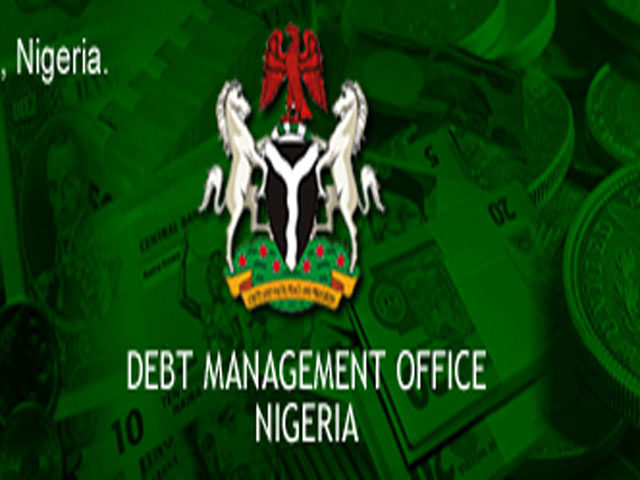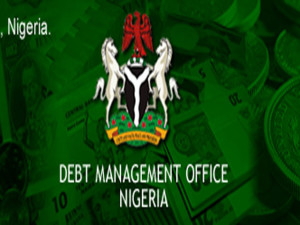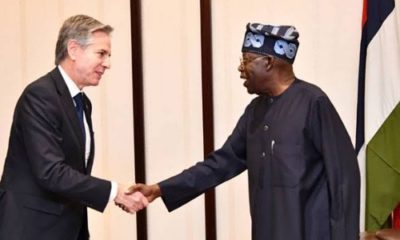Finance
Debt: DMO template excites African Countries

…Uganda, Sudan, others visit Nigeria
By Amarachi Eshiogu
ABUJA-IN its nearly two decades of existence, Nigeria’s Debt management Office, DMO, has not ceased to attract public interest in the discharge of its statutory duties.
Coming at a time when the country was battling with stifling foreign and local debt, it was natural that the attention of the world was glued to the DMO from its inception in 2000. Such interest has remarkably remained till date. Primarily established to centrally coordinate the country’s debt, which was earlier handled by various agencies, without positive result, the DMO, has been on the track of ensuring good debt management practices that make positive impact on economic growth and national development, particularly in reducing debt stock and cost of public debt servicing in a manner that saves resources for investment in poverty reduction programs.
Primarily established to centrally coordinate the country’s debt, which was earlier handled by various agencies, without positive result, the DMO, has been on the track of ensuring good debt management practices that make positive impact on economic growth and national development, particularly in reducing debt stock and cost of public debt servicing in a manner that saves resources for investment in poverty reduction programs.
Like during the administration of former President Olusegun Obasanjo when the DMO in partnership with the finance ministry, facilitated the debt relief Nigeria got from creditor nations, the agency is at it again with the proposal to restructure the debt owed by state governments.
The aim is to extend the life span of such loans while reducing their debt-servicing expenditures. This policy action which now left Nigeria’s insolvent states with enough resources that would have been removed from their accounts by
the banks they are indebted to, has attracted divergent positions from financial experts.
While some applauded the initiative, others simply gave it knocks. Those in support of the move, believes it is the best option available, given the near insolvent state of the nation’s economy.
The argument of the antagonists is that the DMO debt relief would further entrench corruption in the system. They argued that while it is true that the national economy is experiencing a downward trend, most of the states actually compounded the situation through unbridled financial recklessness. Bailing them out would, therefore, amount to
promoting and commending their perceived corrupt tendencies.
But other industry players are quick to discountenance the opinions of the antagonists as probably ill-informed of the workings of the DMO in this regards. They agree that States have been extremely reckless over the years in both spending and borrowing; particularly in the areas refusing to see how to improve Internally Generated Revenue(IGR), they are however quick to add that the DMO should be greatly commended for instilling fiscal discipline amongst the states by way of establishing Debt Offices in all the 36 States of the Federation.
Dr. Anthony Olawale, an Economist said that “the establishment State Debt Management Departments (DMD) have built a very robust and effective tools for states to know their state stock, which hitherto were not known to most of the states”.
“As you know, the DMO conducts debt sustainability analysis at the central level. Now that states have adequate capacity for public debt management having established their DMDs,” he concluded.
Nonetheless, the success of debt package and other interventionist programmes, informed the recent study visit by the Financial Markets Department in the Bank of Uganda in June, 2015.
The aim was to understudy the workings of Nigerian government securities markets as well as have an in-depth understanding and practical workings of the OTC Market for FGN Bonds.
Though, the DMO had in 2005 received requests from Uganda, Sudan, Zambia and Zimbabwe for their Debt Management Offices, Central Bank and National Planning to learn from Nigeria’s experience in public
debt management, the latest visit attested to the widely held belief that the DMO is becoming a model in Africa.
It was gathered that Uganda had twice visited Nigeria for same reasons, which had impacted efficiently on the economy of the East African country.
The first, it was learnt, was in November 2006 when a delegation came to learn from the DMO model as a basis for institutional arrangement.
Towing same line, a delegation from Sudan also came on a study tour to Nigeria on two occasions. Disclosing this, the President of Heritage Savings, Mr. Adegboye Ikiola, who has a deep knowledge of the workings of DMO, said: ’The first delegation came in December 12-16, 2005. Similarly, another delegation from the External Debt Management Unit in the Central Bank of Sudan and Domestic Debt Unit in the Ministry of Finance of Sudan, visited the DMO for a month secondment programme from Monday, June 23 – Tuesday July 15, 2014.
The core objectives of both visits by the Sudanese teams were to learn from the Nigeria’s debt relief and restructuring phases as well as Nigeria’s debt management experiences prior to the establishment of the DMO.’’ Another instance, he said, was a visit by: “A delegation from the Ministry of Finance and National Planning of the Republic of Zambia
undertook a one-week study tour of the Debt Management Office, Nigeria, from 20th – 24th September, 2009. The purpose of the study tour was to enable the Zambians learn how the Debt Management Office, Nigeria is structured, the functions of the Office and how it carries out its responsibilities of managing the country’s public debt and
issuance of the FGN Bonds.’’
‘’I can continue with the examples, because we have to understand what the DMO is doing at this time. A seven-man team from the Zimbabwe Aid & Debt Management Office (ZADMO) in the Ministry of Finance of Zimbabwe visited the DMO for a week study tour from July 17 to 27, 2011 to understudy the processes of establishing and running an
effective debt management office in its efforts to set up a centre of excellence in debt management in Zimbabwe.’’
Another industry expert, Chief Gabriel Nwonuma noted that the DMO has been outstanding on debt management, calling for the sustainability in service delivery.
“Governance is a continuum; the DMO should sustain what it is doing considering the economic crisis in the country. I am happy that they have a very competent team that can sustain its service delivery framework.
DMO staff are frequently invited as resource persons to various training programmes workshops, seminars and conferences by international organizations including the United Nation and World bank’’.
Industry players are of the opinion that given the successes of the MO the Nigerian model should be extended to other African countries to emulate in order to strengthen their debt management profile.
They are as well quick to add that the Office should be encouraged to sustain the training and equipping of her staff for the challenges ahead, particularly in this period that our nation is facing some economic challenges.
Banking
CBN Denies Currency Devaluation

The Central Bank of Nigeria (CBN) has refuted claims of devaluing the.
Earlier reports suggested that the CBN had devalued the Naira, lowering its exchange rate from N631 to the dollar, compared to the previous day’s rate of N461.60 at the Importers and Exporters (I&E) window.
However, the Central Bank of Nigeria (CBN) released a statement on Thursday through its Acting Head of Corporate Communications, Dr. Isa Abdulmumin, categorizing the report as false information.
In the statement titled ‘CBN Has Not Devalued The Naira’, he said the attention of the apex bank was drawn to the news report by an Abuja based newspaper edition of June 1, 2023, titled “CB Devalues Naira To 630/51”.
However, the CBN stated categorically that the news report was replete with outright FALSEHOODS and destabilizing innuendos, ‘reflecting potentially willful ignorance of the said medium as to the workings of the Nigerian Foreign Exchange Market.’
“For the avoidance of doubt, the exchange rate at the Investors’ & Exporters (I&E) window traded this morning (June 1, 2023) at N465/USS1 and has been stable around this rate for a while.
“The public is hereby advised to ignore the news report by Daily Trust in its entirety, as it is speculative and calculated at causing panic in the market,” the CBN spokesman added.
He, therefore, advised media practitioners to verify their facts from the Central Bank of Nigeria before publishing in order not to misinform the public.
Banking
BREAKING: CBN Increases Interest Rate By 0.5%

The interest rate in Nigeria has been raised to 18.5 percent, up by 0.5 percent, from 18 percent where it was pegged in March 2023.
The Central Banks of Nigeria’s (CBN) Monetary Policy Committee (MPC) resolved to this effect at its third meeting of 2023 in Abuja, on Wednesday.
Governor, CBN, Godwin Emefiele, made the disclosure in the communiqué of the MPC’s meeting, thereafter.
While engaging the media at the end of the two-day meeting, Emefiele, said the committee voted to keep the asymmetric corridor at +100 and -700 basis points around the MPR.
In the view of the MPC, rising inflation rate is traceable to the high energy cost and challenges around the supply chain, among others, which lie outside the corridors of the CBN.
Emefiele said, “The current trend in price development would continue to be monitored by the bank with greater collaboration with fiscal authority to address the drivers of inflation.”
Biztellers reports that the CBN had effected six consecutive interest rate increases, which has seen the rate move from 11.5 percent in March 2022 to 18.5 percent in May 2023.
Finance
Dangers Lurk As Nigerians Resort To Refurbished Gas Cylinders

In Nigeria, people have been forced to come up with creative solutions to cope with the effects of inflation and the economic crisis.
These improvised strategies have not only helped individuals save money, but also enabled them to stay afloat during difficult times.
In a concerning development, the recent trend of boycotting the high cost of cooking gas cylinders in Nigeria may pose a greater risk to lives than it does in terms of saving money.
Economy&Lifestyle investigations have revealed that the soaring prices of gas cylinders have reached a point where it has become increasingly challenging for average households to afford them, let alone refill them with gas.
The situation is further exacerbated by the fact that the pump price of kerosene, which would typically serve as an alternative, has become prohibitively expensive.
Upon investigation, it was found that the prices of gas cylinders vary depending on their sizes. A 3kg gas cylinder is priced at N14,000, while a 5kg cylinder costs N16,000. The larger cylinders are even more costly, with a 6kg cylinder priced at N17,000 and a 12.5kg cylinder costing N19,000.
Additionally, the expense continues when it comes to filling these cylinders with cooking gas, as it costs N2,600 for a 3kg cylinder, N5,200 for a 6kg cylinder, N8,950 for a 10.5kg cylinder, and N10,650 for a 12.5kg cylinder.
Consequently, an average household that needs to replace a worn-out 5kg cylinder would have to come up with N20,250 to purchase a new cylinder and fill it with gas, which can be a difficult feat to achieve.
As a result, many people have resorted to refurbishing their old cylinders and trying to use them as best as they can. However, this approach poses a significant danger.
Mrs. Rukayat Adesoji, a trader, shared her experience regarding her gas cylinder, which had become rusted and could no longer stand upright since last month. Due to the exorbitant prices of purchasing new cylinders, she resorted to seeking the assistance of a welder.
The welder patched the legs of the cylinder, repainted it, and ever since then, she has been using the refurbished cylinder for her cooking needs.
She said ““My gas cylinder which was 6kg got rusted and no longer stands erect since last month. When I asked for the price, I was told it was N17, 500. I was discussing it with a friend who advised me to take it to a welder to paint it and construct a new stand. I heeded to her advice and at the end spent just N3, 000 to turn my cooking gas to a brand new.”
Apart from refurbishing cylinders, some people don’t even know when their cylinders will expire. Mrs. Mercy Opara, a hair stylist, falls in that category as she explained: “I am taking my gas cylinder to the welder to spray it for me. It just cost N1, 500.
“The cost of buying a new cylinder is high. I have been using my cylinder for over 7 years and I don’t even know the expiry date. I just pray God blesses me so that I can buy a new one. But this one I am managing will look neat after spraying it for another two years.”
Mr. Adekanbi Joseph, a wielder, said he paints cylinder and “To paint and rebuild a cylinder stand, I charge N4, 500. Many people come here to paint as a new cylinder is now very expensive to get.”
Highlighting the potential dangers of using refurbished cylinders, Mr. Benjamin Hope, the Chief Executive Officer of FKT Cooking gas and general goods, emphasized the risks involved.
He stated that even a brand new cylinder can pose a risk of explosion if the locks are not properly secured after use or if the cylinder filled with gas is moved from one location to another.
He said “A brand new cylinder can explode if the locks are not well keyed after using and if the cylinder filled with gas was moved from one place.
“There are many reasons for the high cost of gas cylinders in Nigeria. One is the cost of importation due to the exchange rate. Another is the increased migration from the use of kerosene to cooking gas which has necessitated increased demand for gas cylinders. You know that in such a case there will be increased importation of cylinders.”he added












